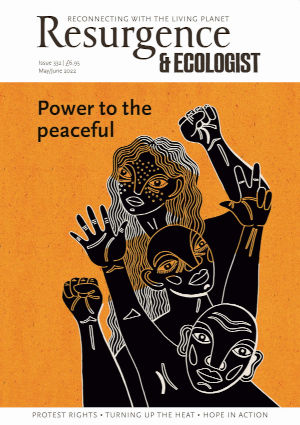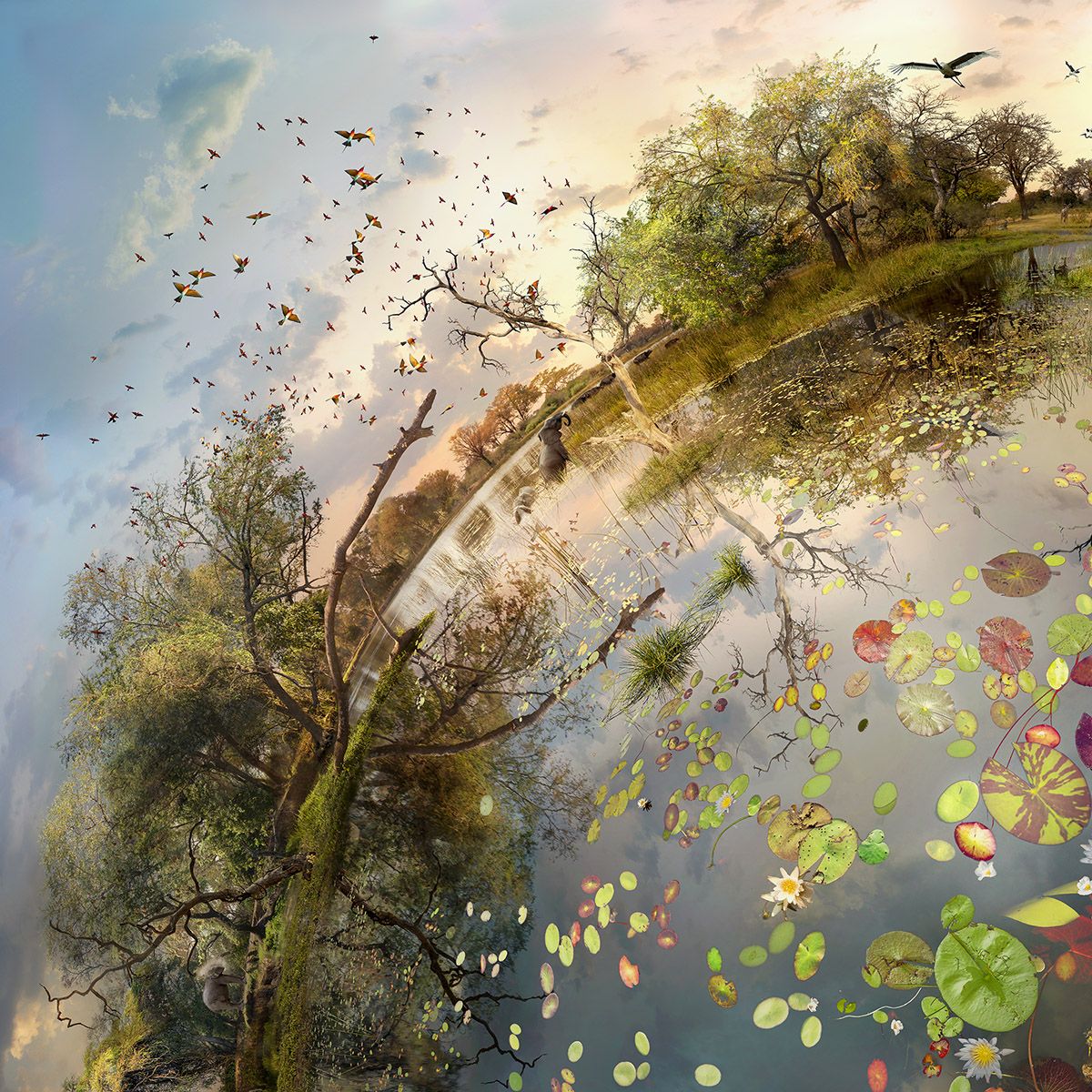The Omega Institute in New York State gave me the opportunity to have this conversation with Jane Goodall, who is an outstanding champion of ecological sustainability and social harmony. She is a UN Messenger of Peace and a protector of wild chimpanzees.
Satish Kumar: You have written this wonderful book, The Book of Hope. How do you maintain hope? We are surrounded by all these big problems like the pandemic, climate change and poverty. You still maintain this deep hope in your heart. How do you do that?
Jane Goodall: Well, first of all, let me explain what I mean by hope. Hope isn’t something passive. I see us now as in a very dark tunnel, and at the end of this dark tunnel is a little star of light, and that’s hope. Well, we don’t just sit at our end of the tunnel and hope that light will come to us. No. We have to roll up our sleeves and crawl under and climb over all the obstacles between us and that star of light. So hope is about action. If we lose hope, that’s the big disaster. If we lose hope, why bother? Eat, drink and be merry, for tomorrow we die! When you have hope, you take action, and you see that you are making a difference and that makes you feel good, and if you feel good, you want to feel better, so you want to do more, and then other people get inspired, so it’s a, sort of, outward spiral gathering in more people as it goes.
Although we’re surrounded by doom and gloom, there are also so many amazing things happening. Recently, an absolute landmark decision was made in Ecuador, where the Constitutional Court, the highest court of law, upheld the rights of Nature. The court told the government that they had to remove all of their mining concessions from places that were protected. And that’s a big step forward. That gives me hope! If the whole world would respect the rights of Nature, what a different world it would be! Every major culture has the same golden rule: do to others as you would have them do to you. Supposing we all followed that rule, wouldn’t it be a fabulous world?
One of my greatest reasons for hope is the young people, because once they understand the problems, they take action – they just go with it. In our Roots & Shoots programme, they choose projects that they feel deeply about, to help people, to help animals, to help the environment, because it’s all interrelated. Young people are changing the world, they’re changing their parents and they’re changing their grandparents!
Young people as well as people at large need to establish a spiritual connection with the natural world. We need to encourage outdoor education. Schools need to tell young people about climate change and about all the things that humankind is doing that are harmful to Nature.
SK: We need to learn from Nature, learn in Nature and learn about Nature. Nature is the greatest teacher. But what do you mean when you say a spiritual connection with Nature? Generally, we talk about looking after the planet, looking after people, improving environmental conservation and social harmony. Could you expand on this idea of spiritual connection with Nature?
JG: When I am out in Nature, particularly in the rainforest, and when I am on my own in Nature, I feel that I am an integral part of it. I remember being out in the forest one day. There were no chimps around, but there were birds and insects and beautiful foliage. I thought to myself, well, this is the great spiritual power of Nature that I feel all around me, I think there’s a spark of that spiritual power in each one of us, and because we’re human we like to name everything, so we call it a soul or a spirit, and I thought to myself, a little spark of that spiritual power is in every single plant and every single insect and every single animal. So, if we human beings have souls, then all those other beings also have souls. Nature is alive. I felt the spiritual power of Nature. Being out in Nature gives you this amazing feeling of being one with the universe. That is what I call our spiritual connection with Nature.
SK: But we live in the age of the Anthropocene, in a human-made world. People living in cities have little connection with Nature, and whatever Nature they have is all human-made. There is very little wild in the cities. How can people connect with Nature when they are so urbanised?
JG: We have to revise and redesign our cities. One way forward is urban tree planting, because when you plant trees you bring Nature into cities. With trees come the birds and the insects. If you go through a big city and if you go through the affluent areas, you will see nice tree-lined streets and there are gorgeous gardens and parks, and then you come to an area where it’s all cement, concrete and grim. That’s where the poor people live. We have to work in those areas and bring Nature there. There was an experiment in Chicago. They took two areas of high crime and they started to green one of them, they planted trees and flowers there. You know, the crime level there dropped dramatically. Then they quickly did it for the other one, where the crime level hadn’t dropped. Again they witnessed profound changes for the better in that area as well. We need to green our cities. In Japan they have invented this thing called Forest Bathing. City people spend time out in the forest and experience the healing power of Nature. Doctors are prescribing time in Nature, because Nature is therapeutic, Nature heals. So let us bring Nature back to our cities. Nature and culture should surely live together.
SK: You have dedicated your life to saving chimpanzees, and there are many other conservationists who are protecting rhinos, tigers and elephants, but we also have to take care of our little species, the insects, the flowers, the birds and many other small creatures who live in jungles as well as in the cities.
JG: Yes, because these small creatures are actually the foundation of everything else. One of the tragedies of our time is that with industrial farming we are destroying the biological composition of the soil. By cutting down the trees and killing the soil with artificial fertilisers we are upsetting the natural balance of life. We need to go back to small-scale farming, regenerative farming, permaculture and agro-ecology. That is what we need to do. We know what to do to make the world a better place, but do we have the will to do it?
SK: Yes, you and I know, but we are a small minority. If you look at big business and the big corporations that are in charge of industrial farming, that are involved in genetic engineering, that produce heavy machinery, artificial fertilisers and artificial intelligence, they don’t seem to know. Yet they are dominating food production. And governments around the world don’t seem to know either. So how are we going to take this message out there into the world of factory farms and agribusiness? How are we going to convince them that we need to produce food without harming biodiversity and wildlife?
JG: Well, let us start with the good news. There are some big corporations out there that are now actually changing. They’re not just greenwashing.
I was talking to the CEO of a big corporation just a few weeks ago and he said, “Jane, for the last eight years I’ve been really working to make my business ethically, environmentally and socially responsible.” He said there were three reasons. “First, I saw the writing on the wall, that we’re using the natural resources faster than Nature can replenish them, and if we go on with business as usual that’s the end. Second, consumer pressure. People are beginning to demand products that are made ethically. Young people and children, too, are telling their parents: I don’t want that, it’s got palm oil from an unsustainable plantation. I don’t want that, it’s got factory-farmed animal in it.” Then he said, “The thing that really tipped the balance for me was about 10 years ago. My little girl came back from school, she was eight years old, and she said: ‘Daddy, they’re telling me that what you do is hurting the planet. That’s not true, is it, Daddy? Because it’s my planet.’”
SK: That is good news, but the world at large is still following biologically and ecologically destructive practices, and the European Union is giving subsidies to such big and destructive farms. In America and Australia megafarms of industrial scale are ruling the roost. You and I are talking about family farms and small-scale farms. How are we going to change the big wide world? Are you still hopeful? Time is running out.
JG: Well, Satish, if you think of the changes that have happened in the last 10 years, they are significant. If you think of the awareness that has grown, even during the pandemic, that is remarkable. Think of the number of people who now realise that we need a different relationship with Nature, we need a more sustainable, greener economy, we’ve got to stop thinking that the be all and end all is the annual growth of GDP, at the expense of the future. That number is incredibly big, and that is encouraging. Such changes are going to be the catalysts. They give me hope.
The thing that I found doesn’t work is putting blame and guilt on people. If you’re approaching high-ranking officials or CEOs, and you’re telling them that they’re bad people and don’t understand what they’re doing, that they have to change and they must change, that is not a constructive approach. At that point they won’t listen, because they’re thinking, how can I refute it, why should this person tell me that I’m doing everything wrong? But if you can find a way to get in there and open their hearts, then you have a chance to change them, because real change comes from within.
SK: I agree. Our activism has to be driven by love – not by anger, not by fear, not by anxiety, not by preaching, but by love.
JG: Yes, that’s where the hope is. I always give people the benefit of the doubt. Maybe they’re really ignorant, maybe they haven’t understood. Some businesspeople have been brought up in this tough business environment, in this cut-throat world, and they haven’t really thought about what they’re doing, so to get them to see the light is a big task! You’ve got to have a feeling for people. You’ve got to have love in your heart and try to find a connection with their heart and help them to understand that caring for Nature is in their best interest. Then they’ll feel better and they will change. This is the nonviolent way of transforming the world.
Jane Goodall’s Book of Hope: A Survival Guide for an Endangered Planet, co-authored with Douglas Abrams, is reviewed here.
Listen to the complete conversation between Satish Kumar and Jane Goodall.
Read a longer version of this interview.
www.janegoodall.org.uk







